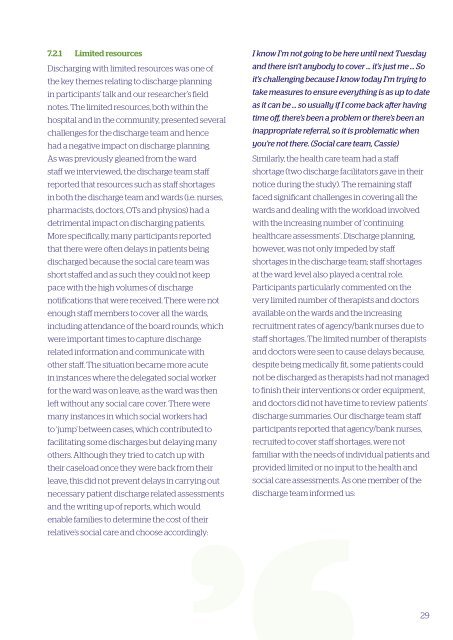Hospital Discharge
3Jzx309Yruj
3Jzx309Yruj
Create successful ePaper yourself
Turn your PDF publications into a flip-book with our unique Google optimized e-Paper software.
7.2.1 Limited resources<br />
Discharging with limited resources was one of<br />
the key themes relating to discharge planning<br />
in participants’ talk and our researcher’s field<br />
notes. The limited resources, both within the<br />
hospital and in the community, presented several<br />
challenges for the discharge team and hence<br />
had a negative impact on discharge planning.<br />
As was previously gleaned from the ward<br />
staff we interviewed, the discharge team staff<br />
reported that resources such as staff shortages<br />
in both the discharge team and wards (i.e. nurses,<br />
pharmacists, doctors, OTs and physios) had a<br />
detrimental impact on discharging patients.<br />
More specifically, many participants reported<br />
that there were often delays in patients being<br />
discharged because the social care team was<br />
short staffed and as such they could not keep<br />
pace with the high volumes of discharge<br />
notifications that were received. There were not<br />
enough staff members to cover all the wards,<br />
including attendance of the board rounds, which<br />
were important times to capture discharge<br />
related information and communicate with<br />
other staff. The situation became more acute<br />
in instances where the delegated social worker<br />
for the ward was on leave, as the ward was then<br />
left without any social care cover. There were<br />
many instances in which social workers had<br />
to ‘jump’ between cases, which contributed to<br />
facilitating some discharges but delaying many<br />
others. Although they tried to catch up with<br />
their caseload once they were back from their<br />
leave, this did not prevent delays in carrying out<br />
necessary patient discharge related assessments<br />
and the writing up of reports, which would<br />
enable families to determine the cost of their<br />
relative’s social care and choose accordingly:<br />
I know I’m not going to be here until next Tuesday<br />
and there isn’t anybody to cover … it’s just me … So<br />
it’s challenging because I know today I’m trying to<br />
take measures to ensure everything is as up to date<br />
as it can be … so usually if I come back after having<br />
time off, there’s been a problem or there’s been an<br />
inappropriate referral, so it is problematic when<br />
you’re not there. (Social care team, Cassie)<br />
Similarly, the health care team had a staff<br />
shortage (two discharge facilitators gave in their<br />
notice during the study). The remaining staff<br />
faced significant challenges in covering all the<br />
wards and dealing with the workload involved<br />
with the increasing number of ‘continuing<br />
healthcare assessments’. <strong>Discharge</strong> planning,<br />
however, was not only impeded by staff<br />
shortages in the discharge team; staff shortages<br />
at the ward level also played a central role.<br />
Participants particularly commented on the<br />
very limited number of therapists and doctors<br />
available on the wards and the increasing<br />
recruitment rates of agency/bank nurses due to<br />
staff shortages. The limited number of therapists<br />
and doctors were seen to cause delays because,<br />
despite being medically fit, some patients could<br />
not be discharged as therapists had not managed<br />
to finish their interventions or order equipment,<br />
and doctors did not have time to review patients’<br />
discharge summaries. Our discharge team staff<br />
participants reported that agency/bank nurses,<br />
recruited to cover staff shortages, were not<br />
familiar with the needs of individual patients and<br />
provided limited or no input to the health and<br />
social care assessments. As one member of the<br />
discharge team informed us:<br />
29


